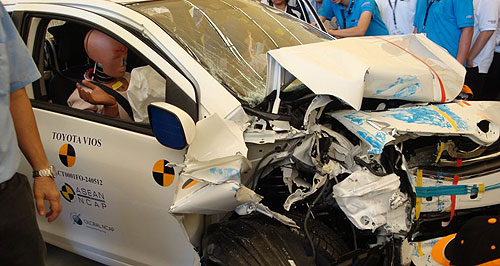Make / Model Search
News - General News - SafetyAsian NCAP starts crash testsReducing the toll: A new NCAP crash test program in Malaysia is aimed at reducing the road toll in Southeast Asia where about 100,000 lives are lost each year. Scope for Australasian NCAP to use ASEAN crash test results in future16 Nov 2012 THE recently formed Association of Southeast Asian Nations New Car Assessment Program (ASEAN NCAP) completed its first official crash test in Malaysia this week. In the initial phase, seven cars will be crashed at 64km/h in frontal offset test that is consistent with those performed by Australasian NCAP (ANCAP). ANCAP communications manager Rhianne Robson told GoAuto that one of ANCAP’s engineers was in Malaysia to help with the tests and ensure they were completed to the same check-list. She said it was too early to determine if test results from ASEAN NCAP could be used to calculate ANCAP ratings. ANCAP shares data with Euro NCAP, but has a longer-term intent for NCAP organisations from around the world to share data. Ms Robson said cars tested by ANCAP were subject to a more comprehensive set of five physical tests and assessments compared with its ASEAN counterpart. She said ASEAN NCAP’s testing program was still in its early stages and a work in progress, with testing limited to the aforementioned frontal offset crash test. “It is a learning process for the Malaysians and they are keen to have support from us in terms of getting it done correctly,” she said. “It has been an ongoing process for some two years or so now and we will continue to (support them) as the programme rolls out. “They have this phase one with seven vehicles and no doubt if that is all successful they will continue with another phase in time to come.” The first seven vehicles tested by ASEAN NCAP are all light cars, comprising the Ford Fiesta, Honda City, Hyundai i10, Nissan March (Micra), Perodua MyVi, Proton Saga and Toyota Vios. ASEAN NCAP tests are done at a new crash lab operated by the Malaysian Institute of Road Safety Research (MIROS) in the city of Malacca, about 140km south-east of Kuala Lumpur. It is hoped the introduction of NCAP testing in the ASEAN region will help raise consumer awareness of safe vehicles, put pressure on manufacturers to increase safety in their products and help stem the region’s rising road toll, which claims more than 100,000 lives a year. Results will be announced next year, based on a score out of the maximum 16 points awarded for the frontal offset test. Ms Robson agreed that crash-testing in Malaysia could also eventually expedite ratings – and yield crash-test cost savings – for the increasing number of cars exported to Australia from Thailand, Malaysia and Indonesia. Australia entered a free-trade agreement (FTA) with Thailand in 2005, which has helped the kingdom become Australia’s second-largest source of imported cars after Japan, with almost 136,000 Thai-sourced vehicles registered here year-to-date. The number of vehicles sourced for Australia from ASEAN is set to increase as another FTA with Malaysia has been recently concluded (and is undergoing domestic approval process), while a comprehensive economic partnership agreement with Indonesia is under negotiation. Honda, which was badly hit by extensive flooding in Thailand a year ago, is looking to Indonesia and Malaysia as a way of diversifying its sourcing and protecting itself from future natural disasters – and Nissan already sources the Micra light car from Indonesia. Global NCAP – established to support the United Nations Decade of Action for Road Safety effective 2011-2020 – recently held an expert technical working group meeting in Japan, where increased consistency of tests and data sharing was discussed. A common ‘library’ of tests and assessment methods was proposed, along with improved communication methods, with a view to reducing duplication of work and to help increase the presence of NCAP in emerging markets. Attending the meeting were NCAP representatives from Australia, ASEAN, Europe, Japan and Latin America, along with members of the United States National Highway Traffic Safety Administration. ANCAP chairman Lauchlan McIntosh said greater collaboration between the organisations “would provide a number of benefits to NCAPs, manufacturers and consumers alike”. “In addition, with the recent introduction of many collision avoidance technologies, common testing and assessment methods would assist consumers to buy and hence manufacturers to equip new cars with these technologies across all markets.”  Read more31st of May 2012  ASEAN gets NCAP safety schemeCrash testing programme takes off in Southeast Asia with ASEAN NCAP23rd of May 2012  Auto industry wary of Malaysian free trade dealProton happy with zero tariff, but Aussie car companies in no rush for Malay exports3rd of April 2012  Honda Oz looks to Indonesia, MalaysiaAsian factory expansion opens door for Honda cars from plants outside Thailand |
Click to shareGeneral News articlesResearch General News Motor industry news |











Facebook Twitter Instagram